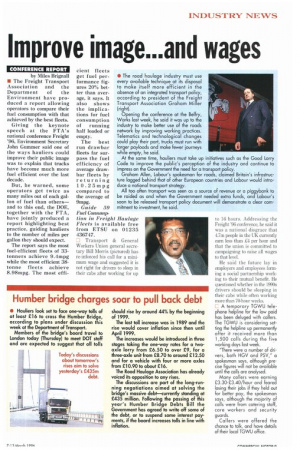Improve image...and wages
Page 11

If you've noticed an error in this article please click here to report it so we can fix it.
CONFERENCE REPORT
by Miles Brignall • The Freight Transport Association and the Department of the Environment have produced a report allowing operators to compare their fuel consumption with that achieved by the best fleets.
Giving the keynote speech at the FIA's national conference Freight '96, Environment Secretary John Gummer said one of the ways hauliers could improve their public image was to explain that trucks have become much more fuel efficient over the last decade.
But, he warned, some operators get twice as many miles out of each gallon of fuel than others— and to this end, the DOE, together with the PTA, have jointly produced a report highlighting best practice, guiding hauliers to the number of miles per gallon they should expect.
The report says the most fuel-efficient fleets of 33tonners achieve 9.4mpg while the most efficient 38tonne fleets achieve 8.98mpg. The most effi cient fleets get fuel performance figures 20% better than average, it says. It also shows the implications for fuel consumption of running half loaded or empty.
The best run drawbar fleets far surpass the fuel efficiency of average drawbar fleets by returning 10.2 5mpg compared to the average of 9mpg.
Guide 59 Fuel Consumption in Freight Haulage Fleets is available free from ETSU on 01235 436747.
Transport & General Workers Union general secretary Bill Morris (pictured) has re-inforced his call for a minimum wage and suggested it is not right for drivers to sleep in their cabs after working for up
to 16 hours. Addressing the Freight '96 conference, he said it was a national disgrace that 4.7m people in the UK currently earn less than £4 per hour and that the union is committed to campaigning to raise all wages to that level.
He said the future lay in employers and employees forming a social partnership working to their mutual benefit. He questioned whether in the 1990s drivers should be sleeping in their cabs while often working more than 70-hour weeks.
A temporary TGWU teleohone helpline for the low paid iris been deluged with callers. The TGWU is considering setting the Moline up permanently after it 'eceivecl more than 1,500 cells during the five working days last week.
"There were a number of drivers, both HGV and PSV," a spokesman says, although precise figures will not be available until the calls are analysed. Many callers were earning 23.30-£3.40/hour and feared losing their jobs if they held out for better pay, the spokesman says, although the majority of calls were from catering staff, care workers and security guards. Callers were offered the chance to talk, and have details of their local TGWU office. • The road haulage industry must use every available technique at its disposal to make itself more efficient in the absence of an integrated transport policy, according to president of the Freight Transport Association Graham Miller (right). Opening the conference at the Belfry, Warks last week, he said it was up to the industry to make better use of the roads network by improving working practices. Telematics and technological changes could play their part, trucks must run with larger payloads and make fewer journeys while empty, he said. At the same time, hauliers must take up initiatives such Code to improve the public's perception of the industry impress on the Government the need for a transport policy. as the Good Lorry and continue to Graham Allen, Labour's spokesman for roads, claimed Britain's infrastructure lagged behind that of other European countries and Labour would introduce a national transport strategy. All too often transport was seen as a source of revenue or a piggybank to be raided as and when the Government needed extra funds, and Labour's soon to be released transport policy document will demonstrate a clear commitment to investment, he said.
















































































































